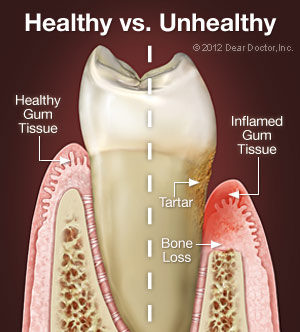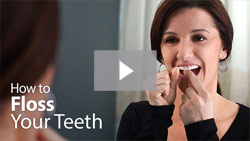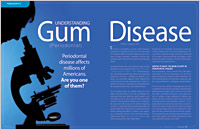Bleeding Gums
Most people have experienced bleeding gums at one time or another. That means it's perfectly normal, right? Wrong.
It's a misconception that bleeding gums are nothing to worry about; and, contrary to popular belief, it does not result from brushing too hard. While too-vigorous brushing is indeed bad for the gum tissue (sometimes causing it to detach from the teeth), it will not make healthy gums bleed. Bleeding gums are most often a sign of gum disease. Fortunately, the condition is easy to treat in its early stages.
Causes
 Red, swollen and/or bleeding gums may characterize a mild form of gum (periodontal) disease called gingivitis. This is an inflammatory reaction to bacterial plaque that builds up at the gum line in the absence of effective daily oral hygiene. Gum inflammation is a sign that your body's immune system is trying to rid your mouth of disease-causing bacteria and promote healing of the damaged tissues. However, the tissues are not likely to heal as long as plaque remains on the teeth. In fact, the disease can worsen into a more serious problem called periodontitis, which is characterized by bone loss around the teeth. Left untreated, advanced periodontitis can result in loose teeth that may eventually be lost.
Red, swollen and/or bleeding gums may characterize a mild form of gum (periodontal) disease called gingivitis. This is an inflammatory reaction to bacterial plaque that builds up at the gum line in the absence of effective daily oral hygiene. Gum inflammation is a sign that your body's immune system is trying to rid your mouth of disease-causing bacteria and promote healing of the damaged tissues. However, the tissues are not likely to heal as long as plaque remains on the teeth. In fact, the disease can worsen into a more serious problem called periodontitis, which is characterized by bone loss around the teeth. Left untreated, advanced periodontitis can result in loose teeth that may eventually be lost.
Some people are particularly prone to gingivitis. Heredity can be a factor; hormones also influence the sensitivity of the gums to disease-causing bacteria. Pregnant women, for example, often experience "pregnancy gingivitis," and adolescents going through puberty may also find that their gums are more prone to bleeding. What you should keep in mind is, the irritants in plaque are responsible for the bleeding — and they should be removed so that your mouth can return to health, before worse problems develop.
Treatment & Prevention

If you have bleeding gums, it is a good idea to come into our office for an exam and thorough professional cleaning. This will temporarily rid your mouth of hardened plaque deposits called calculus or tartar, and other bacterial toxins that become ingrained into the tooth-root surfaces and can lead to inflammation.
With this fresh start, you should then step up your oral hygiene efforts: Make sure to brush at least twice each day with a soft brush and toothpaste that contains fluoride, and floss at least once every day. Brushing by itself will not remove enough plaque to ensure the health of your teeth and gums. We can demonstrate proper techniques if you are unsure how to go about this.

In mild cases of gingivitis, your body's healing response after a thorough professional cleaning may be enough to return you to good periodontal health. If not, additional cleanings or other forms of periodontal (gum) therapy may be recommended. Because gum disease has been linked to other serious inflammatory conditions, including cardiovascular disease and diabetes, it's essential to follow through on all treatment recommendations.
Related Articles

Understanding Gum (Periodontal) Disease Have your gums ever bled when you brushed or flossed? This most commonly overlooked simple sign may be the start of a silent progressive disease leading to tooth loss. Learn what you can do to prevent this problem and keep your teeth for life... Read Article

The Link Between Heart & Gum Diseases Inflammation has emerged as a factor in the process of cardiovascular disease (CVD), which commonly results in heart attacks and strokes. While the precise role inflammation plays in causing chronic CVD remains an area of intense investigation, much more is now known. The good news is that, based on current research, we know that if we can reduce the inflammation caused by periodontal disease, we may reduce the risk for heart attacks and strokes... Read Article

Pregnancy & Oral Health Pregnancy is generally thought of as the time when a woman strives to be particularly aware of the need for better health. Many women, though, may not be aware of the link that exists between their oral health and their systemic (general) health, as well as the impact this can have on a developing child. Learn about how to care for yourself and your baby... Read Article
